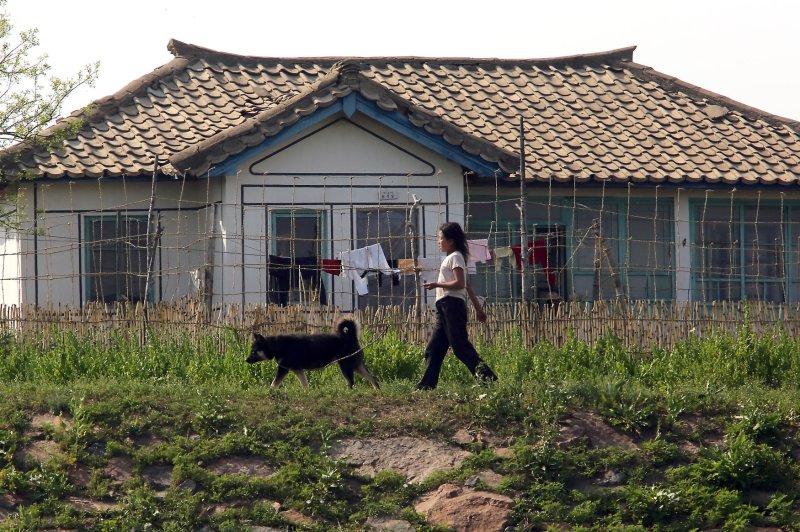A North Korean woman walks her dog in a small village near the North Korean city of Sinuiju. North Korea is asking citizens to collect dog leather ahead of a Oct. 10 anniversary. File Photo by Stephen Shaver/UPI |
License Photo
Oct. 1 (UPI) -- North Korea is requiring citizens to collect "dog skin" or dog fur as part of donations to the regime, according to a South Korean press report.
Daily NK reported Monday Pyongyang is gathering involuntary donations from the population, including contributions of dog fur.
"An ordinance was issued about one month ahead of Party Foundation Day [on Oct. 10] to raise funds for the [Korean Workers'] Party, including through donations of dog fur," a source in North Korea's North Hamkyong Province told the news service Monday. "People without dogs are being made to donate cash."
North Korea has typically asked for donations of dog fur ahead of the anniversary. North Korean students are expected to donate collections of rabbit fur.
Households unable to obtain dog fur or that "do not keep dogs" are expected to give cash, but the cash burden has increased.
Ordinary North Koreans are finding it a challenge to keep up with the demands, according to the report.
"The aim is dog fur collection, but with not enough to eat not many people keep dogs at home," the source said. "If one goes to work, you have to donate twice. Because it is funds for the party, even if you are dissatisfied you have to keep your mouth shut."
If a citizen cannot donate dog fur he or she must give a cash donation of 20,000 North Korean won, or the equivalent of 4 kilograms of rice.
The continued demands on ordinary people come at a time when defections from the regime have slowed in 2018.
According to Park Byung-seok, a lawmaker from South Korea's ruling Democratic Party of Korea, Seoul has registered the lowest number of defections in the period from January to August 2018, since Kim Jong Un assumed power, Tongil News reported.
Defections year-on-year are down 9.7 percent. A total of 703 North Koreans resettled in the South in 2018, according to the report.
The report did not state whether stricter border controls by the North Korean regime were responsible for the decrease.















